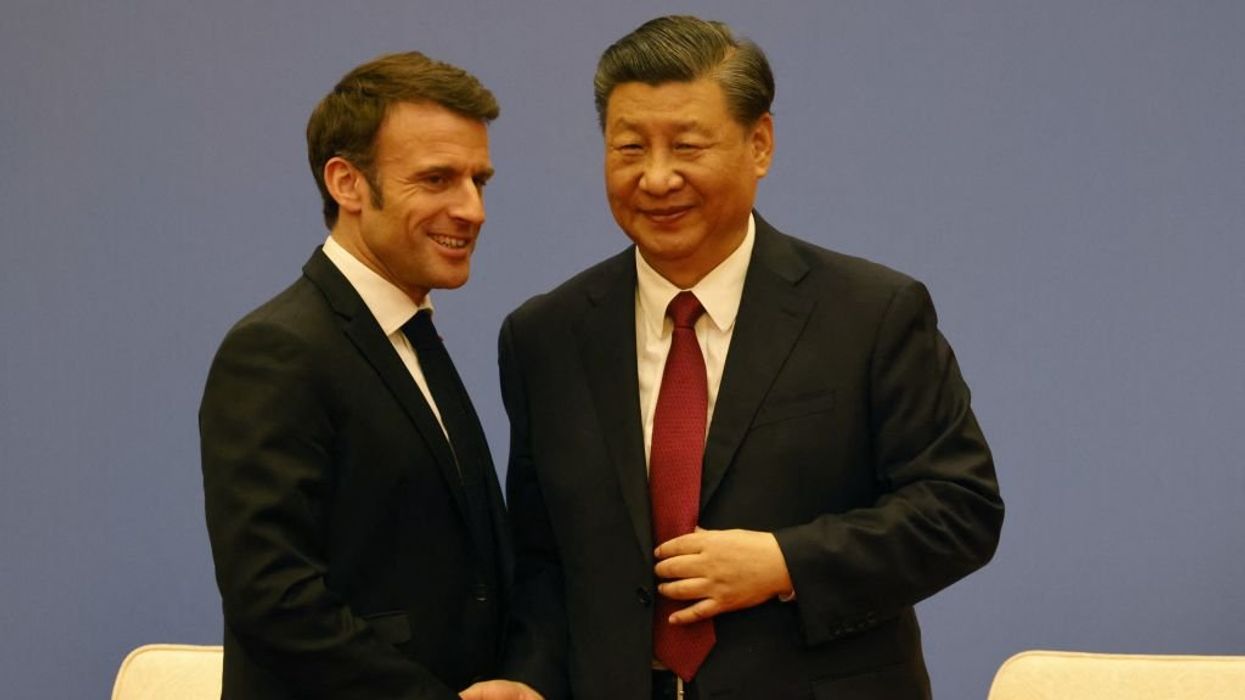
Photo by LUDOVIC MARIN/POOL/AFP via Getty Images

The U.S. fought valiantly to liberate Europe from totalitarian powers in the 20th century and footed the bill for its latest fight with Russia.
Now, confronted with the threat of an increasingly aggressive and genocidal threat in the east, it appears America may not be able to rely on its continental beneficiaries to return the favor.
The European Council on Foreign Relations just published the results of an extensive poll of over 6,000 people across 11 European Union member nations — Austria, Bulgaria, Denmark, France, Germany, Hungary, Italy, the Netherlands, Poland, Spain, and Sweden — "to understand how European citizens see their place in the world today."
In the event of a war between the U.S. and China — as might result from a Chinese invasion of the island nation of Taiwan — only a quarter of European respondents, on average, "would like their country, or Europe, to take America’s side."
62% of Europeans surveyed would like to remain neutral, notwithstanding their nations' ongoing infiltration by Chinese communist spies, subversion by illegal Chinese police operations, and economic coercion by Beijing.
The survey also found:
Jana Puglierin and Pawel Zerka, senior policy fellows at the ECFR, indicated the notion of neutrality was naïve, writing, "While remaining neutral in the case of great power confrontation is an appealing idea, a US-China confrontation would have a massive impact on Europe’s trade and economy at a minimum and European countries would certainly not be neutral bystanders. In addition, the US would likely demand loyalty from Europeans, reminding them of America’s pivotal role in ensuring a strong Western response to Russia’s invasion of Ukraine."
There appear to be two dominant schools of thought in Europe: de-risking and deference. While both entail some form of continued appeasement of Beijing, the latter appears to involve more mental gymnastics on the part of leaders who routinely pay lip service to the importance of democracy and human rights.
The ECFR indicated that European Commission president Ursula von der Leyen and French President Emmanuel Macron exemplify the two varieties of collaborators.
Von der Leyen acknowledged in a March speech that China is ramping up its military posture, its policies of disinformation, and economic and trade coercion, stressing, "These escalatory actions point to a China that is becoming more repressive at home and more assertive abroad."
De-risking, according to von der Leyen, will require addressing "distortions created by China's state capitalist system," reassessing the terms of the Comprehensive Agreement on Investment, altogether reducing dependence on China, and limiting economic and national security exposure "in the context of China's explicit fusion of its military and commercial sectors."
Macron, alternatively, makes von der Leyen out to be a hawk with his deferential stance to Beijing.
The ECFR suggested that Macron is willing to prioritize close economic relations, even if that compromises allied nations.
"Macron spoke of reviving the strategic and global partnership with China and deliberately avoided critical remarks on the subject of Taiwan. Like Scholz before him, Macron was accompanied by a business delegation, which concluded numerous agreements in China," reported the ECFR. "Macron’s message to Xi was clear: Paris wants close economic relations with Beijing, even if China does not oppose Russia’s invasion of Ukraine and continues to maintain close relations with the Kremlin."
The New York Times reported that during his China trip in April, Macron reiterated his opposition to the economic decoupling from China favored by the U.S. and his preference for a world where American dominance was minimized or zapped altogether.
According to the ECFR's findings, "European citizens are more on Team Macron than Team von der Leyen. They do not see China as a power that challenges and wants to undermine Europe, and they do not buy into the 'democracy versus autocracy' framework promoted by the Biden administration."
Among the 11 nations where citizens were polled, it appears Germany, Sweden, France, and Denmark are outliers in terms of their citizenry recognizing China as a "rival" or an "adversary."
The rest reckon China to be an "ally" or a "partner."
The Euro-Sino love-in could be disrupted, however, if Beijing officially begins arming Russia.
"On average, 41 per cent would be ready to sanction Beijing in that event, even if that meant seriously damaging Western economies. A minority of 33 per cent, on average, would oppose this," reported the ECFR.